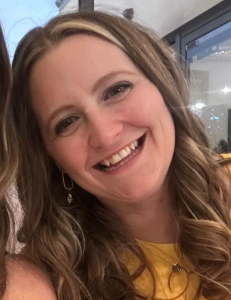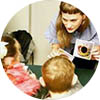Lucas Group
Our laboratory explores mechanisms of light detection and how they are used to support vision and regulate physiology.
Photoreception is one of our key sensory capacities. It forms the basis of vision and of numerous sub-conscious reflex responses to light.
We study how mammals use light to tell time of day and to see. We also study the light sensitive proteins that support photoreception in animals (opsins), with the aim of understanding how they work and exploiting them for optogenetic purposes.
On this page:

Our research
Our research falls into three main areas of study.
How light times biological rhythms
Daily and seasonal variations in light define rhythms in almost all aspects of physiology and behaviour. A distinct, and evolutionarily ancient, sub-division of the visual system encodes this time cue.
We study the fundamental biology of this system, and explore its significance for the design and use of architectural and electronic lighting.
How melanopsin helps us see
Until around 20 years ago it was considered axiomatic that all aspects of vision originated with rod and cone photoreceptors. We now know that there is an additional, inner retinal light detector called melanopsin.
We have a long-standing interest in understanding how melanopsin helps us to see. We discovered that it sets pupil size and can also drive some types of light adaptation. We are now interested in better understanding how melanopsin adjusts vision, and the extent to which it can contribute directly to perception.
Developing animal opsins as optogenetic tools
Animal opsins are light-activated G-protein coupled receptors, and can be used to render mammalian cells photosensitive.
We are now developing sophisticated ways to engineer opsins to exploit this property as effective tools for research and, potentially, clinical application.
Our approach
We maintain a breadth of methodologies to allow the widest scope for addressing interesting questions. This includes all modern methods of circuit labelling and manipulation in the rodent brain and analysis of rodent behaviours and physiology.
We also apply molecular biology and cell culture, viral gene delivery, and in vivo and ex vivo multichannel electrophysiology. We finally have a proud history of method development in the form of optogenetic tools and experimental light sources and displays.
Our impact
Examples of how we have made an impact through our research into light, time and vision.
Measuring and manipulating light
We introduced a method of quantifying light’s effective intensity for melanopsin that is now codified in an SI-compliant metric from the International Commission on Illumination (CIE). It is being used to describe and regulate the light environment across the world.
Read more about measuring and manipulating light, and download our toolboxes.
Regenerative medicine
We have developed human and animal opsins as therapeutics to restore vision in advanced retinal degeneration (patents awarded worldwide).

Our team
Group lead
Rob Lucas – GSK Professor of Neuroscience
Rob maintains broad interests in circadian biology, photobiology and vision science.
In addition to leading the Lucas Group, he is Director of the Centre for Biological Timing and an active member of the Neuroscience, and Vision Research, communities in Manchester.
Bea Bano-Otalora
 Postdoctoral Research Associate
Postdoctoral Research Associate
Bea studied Biology at the University of Murcia (Spain) where she then completed her PhD in circadian physiology. Following a postdoc with Prof Hugh Piggins, she joined the Lucas Lab in 2017. She is currently working on understanding the impact of daytime light exposure and self-selected lighting conditions on circadian rhythms and clock function in a diurnal rodent, Rhabdomys pumilio.
Altug Didikoglu
 Postdoctoral Research Associate
Postdoctoral Research Associate
Altug studied for a BSc in Molecular Biology and Genetics at Istanbul Technical University and an MSc in Developmental Neurobiology at King’s College London. He then completed a PhD in Neuroscience at The University of Manchester. He is currently investigating the effects of light exposure on activity, sleep and human performance using a novel wearable light sensor device.
Qian Huang
 PhD student
PhD student
Qian Huang holds a bachelor’s degree in Clinical Medicine and a master’s degree in Neurology from Capital Medical University in China. Gradually, she found that she preferred doing lab research to clinical practices and became more and more interested in light-related neurobiology.
Currently, she is focusing on how visual scenes influence behavioural states in mammals, using electrophysiological and behavioural recordings of laboratory mice to map the brain’s response to the light environment.
Rebecca Hughes
 Postdoctoral Research Associate
Postdoctoral Research Associate
Becky obtained a BSc in Neuroscience from King’s College London (with a placement year at Eli Lilly UK) and a PhD in Biomedical Science from Lancaster University, studying how genetic risk factors for schizophrenia affect brain function and behaviour in both mice and drosophila. Becky joined the lab in 2018 bringing a wealth of experience in rodent cognition and behaviour to study optogenetic approaches to vision restoration. Becky is currently working on understanding the impact of self-selected light and activity/arousal signals on circadian rhythms and clock function in a diurnal rodent, Rhabdomys pumilio.
Franck Martial
Technician
Franck studied at the Pierre et Marie Curie University, Paris, obtaining a master’s degree in Physiology and Cellular Biology, and a PhD in Neuroscience.
He has a wealth of experience in designing, building and maintaining bespoke experimental equipment, which makes him an invaluable member of the lab, supporting all aspects of our research.
Richard McDowell
 Postdoctoral Research Associate
Postdoctoral Research Associate
Richard obtained a BSc in Biomedical Science and an MRes in Biological Sciences at The University of Manchester, before also completing a PhD in Regenerative Medicine at Manchester.
He is currently investigating structure-function relationships of bistable animal opsins to better define opsin signalling and conduct rational engineering of novel optogenetic tools.
Nina Milosavljevic
 Research Fellow
Research Fellow
Nina obtained an MSc in Molecular Biology and Physiology from the University of Belgrade, Serbia, and a PhD in Molecular and Cellular Interactions, from the University of Nice Sophia Antipolis (now Côte d’Azur University), Nice, France. Nina is a Fight for Sight Early Career Investigator. Her current research interests are optogenetic therapies for treating blindness, and light effects on mood and affective state.
Patrycja Orlowska Feuer
 Research Fellow
Research Fellow
Patrycja obtained an MSc in Biology and PhD in Biological Sciences from the Jagiellonian University in Krakow, Poland. In 2019, she was awarded a Bekker Fellowship (NAWA, Poland) to join the Lucas group, and has subsequently obtained a Marie Sklodowska-Curie Individual Fellowship (European Commission) to stay in Manchester. She is currently investigating photic sensitivity of neurons in the hypothalamic suprachiasmatic nuclei (SCN) in diurnal (Rhabdomys) and nocturnal (mice) rodents and melanopsin’s role in image-forming vision using an array of electrophysiological techniques.
Ashwathi Prithviraj
 PhD student
PhD student
Ashwathi completed her integrated BS-MS degree from the Indian Institute of Science Education and Research, Thiruvananthapuram.
She has a background in chronobiology and neuroscience and is currently investigating the effect of bright light therapy in delaying cognitive decline in models of neurodegenerative diseases.
Rose Richardson
 Postdoctoral Research Associate
Postdoctoral Research Associate
Rose studied for a BSc in Biomedical Science with Neuroscience at the University of Sheffield and then completed an MRes in Interdisciplinary Molecular Medicine and a PhD in Molecular Genetics at the University of Manchester. She is currently using a combination of molecular and behavioural experiments to determine the contribution of the inner retinal photopigment, melanopsin to daytime vision.
Jessica Rodgers
 Postdoctoral Research Associate
Postdoctoral Research Associate
Jess graduated with a BSc in Psychology from the University of York in 2012, then completed a PhD in Clinical Neuroscience from University of Oxford in 2016.
Her current work investigates network remodelling caused by retinal degeneration. She also studies optogenetic therapies for vision restoration.
Tom Woelders
Postdoctoral Research Associate
Tom trained the University of Groningen in the Netherlands, obtaining first a bachelor’s in Psychology, then a master’s in Behavioural and Cognitive Neuroscience, and finally a PhD in Circadian Biology.
He is currently using psychophysical and electrophysiological techniques to explore melanopsin’s contribution to vision.
Jonathan Wynne
 Senior technician
Senior technician
Jon has been at The University of Manchester since 2004 and a member of the Lucas group since 2009.
He plays an invaluable role in ensuring smooth and safe operation of our laboratories and contributes directly to our studies of melanopsin vision and optogenetic visual restoration.

Our partners
Science is a community endeavour, and we are lucky to have colleagues locally and around the world to help us achieve our goals.
Time Vision Behaviour
We share lab meetings, expertise, equipment, social events, successes and failures with four other groups in Manchester with complementary interests in the neurophysiology of time, vision and behaviour.
These groups are led by Annette Allen, Mino Belle, Timothy Brown and Riccardo Storchi.
Centre for Biological Timing
Manchester is a fantastic place to study biological timing, with a large and vibrant community doing research in this area.
Manchester Vision Network
Our local community of scientists across the University with an interest in vision science.
LIGHTCAP
We are proud members of LightCap, a Marie Skłodowska-Curie European Training Network encompassing academic labs and industrial partners and focused on the health and welfare implications of electronic light.
Contact us
If you would like to find out more about our group, please get in touch.
Professor Rob Lucas
AV Hill Building
Oxford Road
Manchester
M13 9PT
Tel: +44 (0)161 275 5251
Email: robert.lucas@manchester.ac.uk
